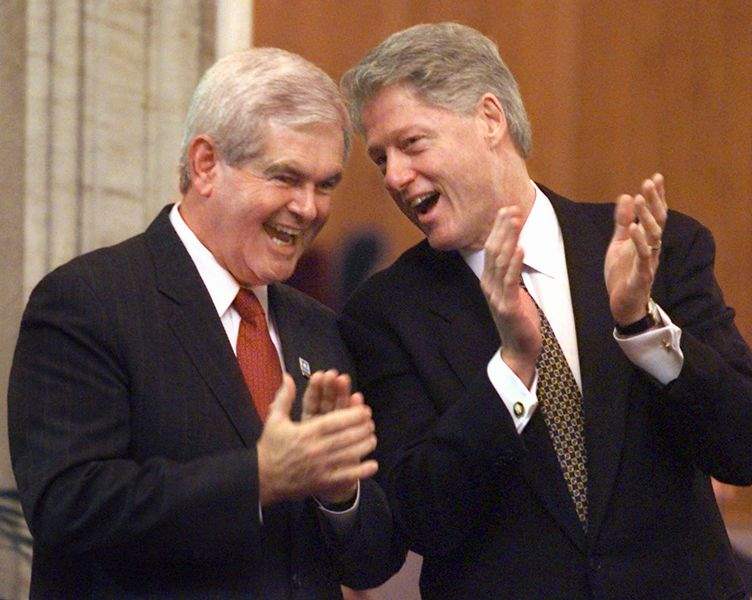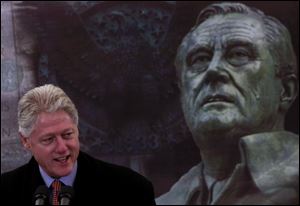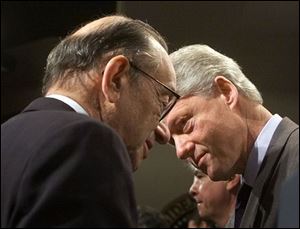
Clinton remains a riddle: charming, maddening, resilient
1/14/2001
The GOP's Newt Gingrich, left, calls Mr. Clinton the best tactical politician of his lifetime.
AP
“The American President resembles the commander of a ship at sea. He must have a helm to grasp, a course to steer, a port to seek.'' - Historian Henry Adams
WASHINGTON - It's been a bumpy voyage.
As Bill Clinton departs the center stage of American politics that he has dominated for eight years, historians rank him as average, he and his supporters think he was a great president, his enemies say good riddance.
The American people say that if they could, they'd re-elect him.
Despite impeachment by the House in December, 1998, on charges of perjury and obstruction of justice, the first baby-boomer president leaves with more than 6 out of 10 Americans saying they approve of the way he has handled his job. Yet he remains among the most controversial of men.
He is a riveting riddle who invites conflicting adjectives: complicated, energetic, maddening, resilient, charming, fascinating, stalwart, risk-taker, smart, indecisive, frustrating, optimistic, cynical, undisciplined, politically brilliant, great speaker, empathetic, eager to do the right thing, driven by polls.
The term “Clintonian'' came to refer to playing with the truth. The term “Clinton fatigue'' became the term for weariness with this high-maintenance political leader. Part of that was the way he demystified the presidency. From the moment he was asked on TV “boxers or briefs,'' he let Americans know more about life in the White House than they ever had known before. And his aides and advisers contributed, writing books by the dozen the moment they left government employment.
Mr. Clinton did not receive a majority in either the 1992 or 1996 election, yet his job-approval rating of 65 percent is higher than the previous high for a two-term president leaving, Ronald Reagan, who left with 63 percent of Americans happy with the job he did.
As president, he not only helped to mold his times but reflected his times.
Historians caution that it will take the passage of time and years of scholarship to analyze the 1990s. But any history of the last decade must include President Clinton's sexual behavior in the Oval Office with Monica Lewinsky, a White House intern half his age, and its aftermath, when he lied in a deposition and to a grand jury
But at 54, the youngest president since Theodore Roosevelt (who was 50) to leave office, Mr. Clinton is losing his job but not going away. He will be the first ex-president since Woodrow Wilson to live in Washington after leaving the White House. Making money is crucial, he says. The Clintons still owe $4 million in legal bills from court cases stemming from the failed Whitewater land deal, the Lewinsky matter, the Paula Jones sexual-harassment case, and fighting independent prosecutors.
Although Mr. Clinton says that being a citizen is the highest honor in America, he admits to some nervousness about returning to private life. He's even worried, he joked the other day, that “my Christian bearing will be tested by a return to commercial air travel, where I will reap the rewards of not having succeeded in one of the things I tried very hard to do, which was to end all those backlogs.''

Mr. Clinton, who spoke at the FDR memorial Wednesday, is the only Democrat to be elected since Roosevelt to a second term.
And, he said, “I anticipate that for some several months, I will be disoriented when I walk into large rooms, because no one will be playing a song anymore. I look forward to finding out whether John Quincy Adams was right when he said there is nothing so pathetic in life as an ex-president.''
Doubtless, Hillary Rodham Clinton's election as the junior senator from New York will keep him in the limelight. And because his vice president, Al Gore, lost to George W. Bush, Mr. Clinton remains the titular head of the Democratic Party, clearly eager to continue to be a presence in the United States and abroad.
Speaking just a few days ago to members of the congregation of Foundry Methodist Church, which he and his wife have attended regularly, the President said:
“In the next chapter of my life, I will do my best to use the incredible opportunities my country has given me to be a good citizen here at home and around the world, to advance the causes I believe in, and to lift the fortunes and hopes of those who deserve a better hand than they have been dealt, whether in Africa, Asia, Latin America or Appalachia, the Mississippi Delta, the inner cities, or the Native American reservations. I will try every day to remember, as apparently for the first time in my life I will be able to earn a sizable income, that Christ admonished us that our lives will be judged by how we do unto the least of our neighbors.''
As presidential historians and pundits try to define the Clinton presidency, they struggle to find a grand saying to define the Clinton years. So far, none has been successful. Inevitably, whether they admire him or not, they conclude that he was a talented, lucky politician who squandered opportunities but became the ultimate political survivor. Most think there will be some sort of third act.
Mr. Clinton himself leaves the job he describes as the best in the world with many mixed feelings ranging from pride to regret for his mistakes and a wistfulness that just as he got the hang of the job, it's been taken from him. “I had a very good time,'' he said a few days ago.
Mr. Clinton has a mantra that he recites at every opportunity. He presided over the longest economic expansion in the nation's 224-year history. He was the only Democrat since Franklin D. Roosevelt to be elected to a second term. He leaves office with inflation at a 35-year low, unemployment at 4 percent (22 million jobs were created in his eight years in office), and welfare levels at their lowest in almost 30 years. The median income for most families went up 10 percent in eight years.
Above all, Mr. Clinton - with the help of Federal Reserve Chairman Alan Greenspan and that of Wall Street investment guru Robert Rubin, who worked on economic policy in the White House and then as Treasury secretary - changed the basic economic outlook from the bleak recessionary blur of 1992. From record deficits when he took office, Mr. Clinton and his team have helped take the country to record surpluses. He now predicts that there will be a $1.9 trillion surplus over the next decade and that without new spending programs or broad tax cuts, the country could be free of publicly held debt in less than 10 years.
Robert Reischauer, who headed the Congressional Budget Office, clashed with the Clinton White House and is now president of the Urban Institute, says that under Mr. Clinton, the nation's economic news has been “spectacular.'' And unlike those who credit Mr. Greenspan or congressional Republicans, Mr. Reischauer says, “I think that historians are going to give a good deal of credit to Clinton for three reasons.''

Federal Reserve Chairman Alan Greenspan helped the President to change the nation's basic economic outlook.
First, he said, Mr. Clinton “risked his administration's future to enact policies to strengthen the economy and improve the budget outlook. Second, the policies he pursued to strengthen the economy and improve the budget were opposed by his core supporters. And, third, he transformed the way the nation, the media, politicians, and others debate the budget, and this transformation could prove to be the most significant of all.''
The administration never fails to point out that not one Republican in Congress voted for Mr. Clinton's deficit-reduction package in 1993 and that a number of Democrats' political careers were ruined because they did support it. President Clinton also signed the welfare reform bill against the wishes of many Democrats, including some in his cabinet. He fought for the North American Free Trade Agreement, allying himself against his labor supporters to get it passed by Congress. And he insisted that part of the surplus be set aside to offset new demands on Social Security.
Mr. Clinton's poorest marks come, ironically, in an area where in recent weeks he tried hardest: foreign policy. A student of international relations while at Georgetown University, President Clinton is faulted not for lack of understanding of the complicated post-Cold War world but most for lack of follow-through.
From his first formal summit with Russian leaders in Vancouver in 1993, he pledged to help Russia get on its feet economically, but little happened. He never got an arms-control agreement. Under him, relations with Europe worsened. His hope for a bold new trade relationship with Asia has yet to materialize.
He worked tirelessly trying to get a Middle East peace agreement, but despite the historic handshake seen around the world that he brokered on the South Lawn between Palestinian leader Yasser Arafat and Israeli leader Yitzhak Rabin, peace eluded him. Violence is more widespread as he leaves office than when he was inaugurated.
He worked hard for an agreement in Northern Ireland, but the results are murky.
And when Mr. Clinton writes his memoirs (he says he's just kidding that his book will be called My Story: And I'm Sticking With It), there will be a surprisingly fat chapter on war.
He bombed targets in four countries: a chemical plant in Sudan, a terrorist camp in Afghanistan, ongoing targets in Iraq, and Serb military defenses in the Federal Republic of Yugoslavia's provinces of Kosovo, Serbia, and Montenegro.
Against enormous opposition, he sent troops to Bosnia and Kosovo, but only after enormous suffering and killing, and it's not clear whether peace will hold if the United States pulls out. He says he most regrets doing little to stop the massacre of thousands in Rwanda. He became known for the Clinton Doctrine, which essentially says that America must get involved to stop humanitarian suffering unless the costs are too high.

The GOP's Newt Gingrich, left, calls Mr. Clinton the best tactical politician of his lifetime.
Richard Haass, a former official in the administration of George Bush and now a foreign-policy expert at the Brookings Institution, a Washington think tank, claims that Mr. Clinton spent only 10 percent of his time on foreign policy. Mr. Haass faults the President most for failing to have a foreign policy “framework'' and for failing to define new post-Cold War relationships with China and Russia.
But where his heart was - helping the poor and minorities - Mr. Clinton tried to make a difference. He pushed through an increase in the earned income tax credit, a major factor in reducing the number of poor families. He pushed through an initiative to wire the nation's schools for Internet access. Although his race initiative seemed to go nowhere, not even producing a report to gather dust upon a shelf, he leaves greatly admired by blacks and Hispanics. He made his most stirring speeches on race.
Hank Aaron, who broke Babe Ruth's home run record in 1974 and went on to become a civil-rights leader, said recently, “I've been spoiled because of Bill Clinton. I think most African-Americans have been spoiled because Bill Clinton has done what's right.''
He wanted to be the environmental president, but until just recently, environmental groups were in despair. The conference on global warming fell apart because of lack of American initiative. But Mr. Clinton took about 60 million acres of public lands out of eligibility to be logged commercially, delighting environmental groups.
When historians have gathered to assess presidents, invariably Abraham Lincoln comes in first, followed by George Washington and Franklin D. Roosevelt. Beginning in 1996, when Mr. Clinton first was ranked, a few historians ranked him “near great,'' and a few ranked him as a “failure.'' But overall, he continues to be ranked as “average'' and “in the middle'' of the 42 presidents so far.
And yet, the word “average'' seems a weak one to describe this man who has mesmerized the American psyche for so long.
President Clinton promised to build a bridge to the 21st century. It was a lot trickier undertaking than he thought it would be, for him and everyone else.